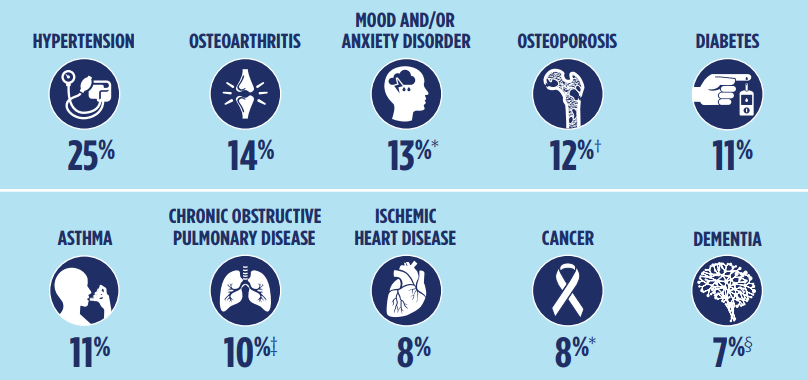Rethinking Obesity and Its Impacts on Canadians and Their Benefits Plan
By: Benefits by Design | Tuesday October 26, 2021
Updated : Wednesday April 20, 2022
Obesity is a growing problem in Canada.
In 2018, 63% of the population faced increased health risks due to excess weight, and it’s almost certainly increased since then. Although it is common in Canada, there are still many misconceptions about obesity. Consider the way it’s regarded by Canadians, the way it affects benefits plans, and even the way it’s treated by healthcare practitioners.
Let’s take a closer look at obesity and ask ourselves: is it time to change how we think about it?
What is “Obesity”?
We’ve come to understand obesity as a chronic condition a bit better over time. Here’s how Dr. Jonathan Gabor defined it on a recent webinar we hosted with him:

It sounds very similar to the way we talk about other chronic conditions like osteoarthritis or cancer, doesn’t it? But there’s a key difference: stigma.
Rethinking Obesity and Reducing Bias
Obesity still faces an uphill battle when it comes to stigma. Many still consider obesity to be more of a “lifestyle” choice, rather than a chronic health condition. Even healthcare providers aren’t immune to this weight bias — 64% of adults living with obesity reported experiencing weight bias from a healthcare provider.
Body Mass Index (BMI)
The Body Mass Index (BMI) is often linked with obesity and has been used for many years. As we learned from Dr. Gabor, the BMI isn’t the best method of assessing health.
Though useful in some cases, the BMI is not an all-encompassing measure. As a simple height-to-weight ratio, it can be misleading or in some cases inaccurate. For example, a six-foot-two, 29 year old male bodybuilder might measure in the “obese” category of the BMI, but in reality, is quite healthy and fit. Similarly, we know that weight is not the sole indicator of health, and so a person with a “healthy” BMI may still have some unhealthy practices that could lead to health complications.
Obesity as a Chronic Condition
Approximately 27% of Canadian adults are living with obesity, making it one of the most prevalent chronic diseases in Canada. To put this percentage into perspective, here’s a glance at ten of the other most common chronic conditions in Canada:

Obesity’s Impacts on Benefits Plans, Advisors, and Employers
In the group insurance industry, there’s a term that we hear quite frequently as it relates to certain medications and prescriptions: lifestyle drug.
A lifestyle drug is a type of drug that supports a manner of living. Lifestyle drugs are used for non-health problems or for conditions that lie at the boundary between a health need and a lifestyle wish. Some common medications grouped under this term typically include:
- Anti-obesity medications
- Fertility drugs
- Erectile dysfunction medications
- Smoking cessation programs and aids
Should anti-obesity medications be a “lifestyle” drug, given what we know today about obesity? Or is this an outdated method of classifying these medications? That’s not a question we’ll be answering today, but it’s important to think about as we continue talking about the impacts on benefits plans.
Links to Other Chronic Conditions
Obesity is linked to many other chronic conditions. It can exacerbate symptoms, increase risk factors, and in time lead to other health complications. Many of these linked chronic conditions are familiar high-cost claims on benefits plans, including (but certainly not limited to):
- Heart disease
- Stroke
- High blood pressure (hypertension)
- Diabetes
- Cancer
- Osteoarthritis
- Breathing problems, including sleep apnea and asthma
While there are plenty of fad-diets and supplements that claim to miraculously help people lose weight, these only perpetuate the stigma. However, there is weight loss information available that can compliment anti-obesity medication. As we continue to spread awareness and support for obesity, we hope to see more improvements in medications and research to combat this chronic condition.


